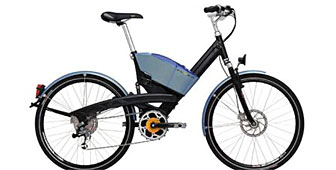Pedal power gets an extra push

Bicycles which combine electrical propulsion with pedal power are still too expensive for most cyclists, but the future looks promising.
“An e-bike is not a substitute for an ordinary push-bike. It’s a very different animal,” claims Hans-Jürgen Wenger, who owns one of Switzerland’s handful of e-bike centres.
“It’s a very advanced piece of technology,” agrees Daniel Bachofner of IG Velo, a group set up to defend the interests of cyclists.
E-bikes are designed to maximise speed by supplementing the pedal power of the rider with an environmentally sound electric motor.
Two families of e-bikes
There are two basic types of electrically powered bicycles. One type is regulated manually using a twist-grip, similar to that on a conventional motorbike. It has an electric motor fitted to the rear wheel and a battery mounted on the luggage carrier. The motor is powerful enough to propel the bike without any effort from the rider. The Tour de Suisse company sells several models of this type.
The other type – the Pedelec – has both the motor and battery located in the centre of the frame, and the output of the motor depends on the rate at which the cyclist pedals.
Depending on the model, the motor activates itself when the pedalling rate falls below a certain level, say 60 revolutions per minute. These bikes are particularly appropriate for elderly people or commuters who want to get to work on time, without tiring themselves out. Two popular models are the BKTech Flyer and the Velocity Dolphin.
As with conventional bicycles, prices vary considerably. The cheapest (Tour de Suisse) costs around SFr2,500. Flyer and Dolphin models begin at around SFr4,000, but some models retail for as much as SFr10,000.
E-bikes weigh between 25 and 30 kilogrammes. Basic models can be expected to maintain an average speed of 25kph; more advanced ones more than 30kph.
The range of a standard battery is around 25km, although it can last twice as long if the rider supplements the motor with pedal power. The battery takes two to three hours to recharge by plugging it into any electrical socket.
Limited sales to date
“Personally, I think e-bikes are an excellent option, at least in built-up areas and for short journeys. I use an e-bike for my twice-weekly visits to Bern,” says Hans-Jürgen Wenger, who sells the bikes in Thun, 30 km southeast of the Swiss capital.
But, for the time being, e-bikes are staying in the shops, putting the squeeze on many manufacturers. Wenger says interest in the new technology is growing, thanks to technical improvements over the past three years (the first heavy, very bulky e-bikes appeared some ten years ago). But only five or six thousand e-bikes are currently plying the Swiss roads.
“The product is not yet very accessible, unless you know exactly what you’re looking for. My shop is one of only four specialised centres covering the whole country,” says Wenger.
Image problem
“There’s also an image problem,” adds Daniel Bachofner. “People who choose bicycles are attracted mainly by their technical simplicity and relative cheapness. E-bikes are a high-tech alternative, and must contend with entrenched competition.”
The other problem, in Switzerland at least, is over-regulation, says Wenger. “Swiss regulations in this field differ from European ones. Every new model must be electrically tested by the Swiss Federal Office of Transport, which hardly encourages European manufacturers to market their products in Switzerland.”
Swiss manufacturers are operating on too small a scale to launch substantial advertising campaigns. The result is that in Switzerland e-bikes have remained a niche phenomenon, while in other countries (Germany, Holland, Italy, France, Japan and even China, for instance) they are far more popular and widely sold.
Switzerland also requires e-bike users to have a motorcycle licence, which can put out potential buyers, particularly the elderly.
What about the future?
E-bikes would seem to be an excellent solution to the worsening problem of congestion. The authorities are slowly starting to recognise this. The cantons of Bern and Basel have launched campaigns to encourage the use of e-bikes.
“I hope the authorities will play an even more active part, says Hans-Jürgen Wenger. I believe in e-bikes and am sure they need to be promoted more vigorously. After all, they’re quick and inexpensive to park, they don’t pollute, they help to keep you fit and… you don’t even need to take a shower when you get to the office!”
by Marzio Pescia

In compliance with the JTI standards
More: SWI swissinfo.ch certified by the Journalism Trust Initiative
You can find an overview of ongoing debates with our journalists here. Please join us!
If you want to start a conversation about a topic raised in this article or want to report factual errors, email us at english@swissinfo.ch.